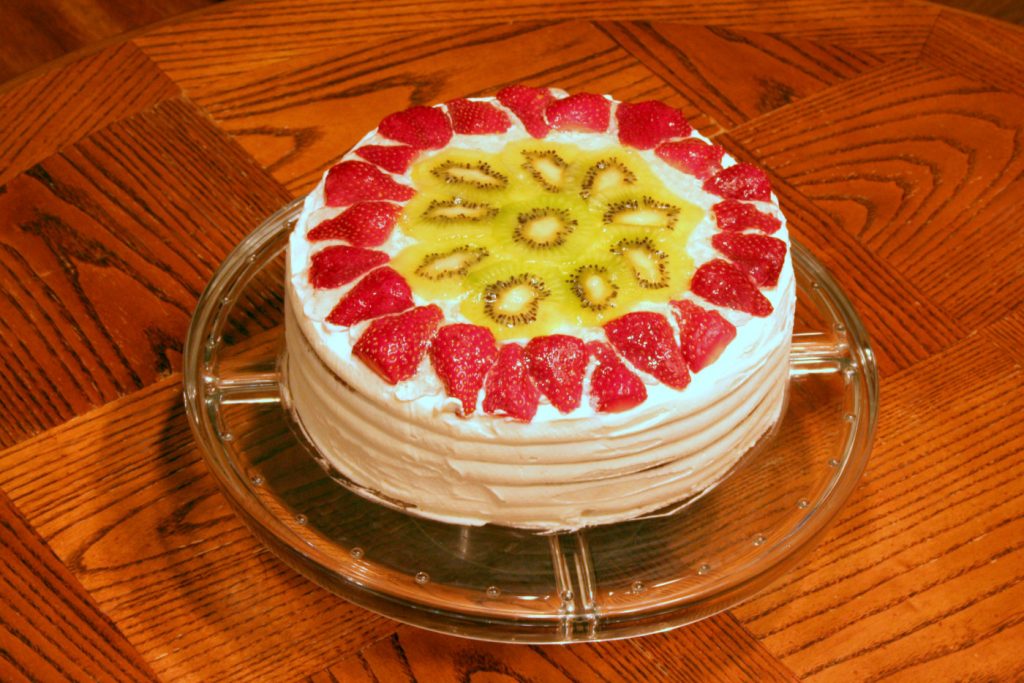Let’s Just Call It Love

A few years before my husband, Todd, was diagnosed with ALS, he baked a cake for a church fundraiser with one hand while our infant daughter slept on her stomach across his other forearm, her head cradled in his hand. It was impressive enough that he could make the traditional Finnish layered cake frosted with whipped cream and topped with berries, but he made it gluten-free in the days before gluten-free mixes were readily available.
Todd had made the dessert several times before, experimenting with different types and ratios of gluten-free flours along with xanthan gum and additional egg whites. He did it for me, out of love, because I was on a gluten-free diet. I delighted in reexperiencing the cake a Finnish woman had made for our wedding reception.

Todd baked a traditional Finnish cake for a church fundraiser, March 2006. (Photo by Todd Neva)
I felt loved and supported in our early years of marriage when Todd helped with cleaning, cooking, and grocery shopping. He changed his share of diapers. He took care of all the household and vehicle maintenance, so I didn’t even have to think about it.
People talk of marriage as a partnership that works best when there is equal give-and-take. Spouses might take on different roles based on interests and competencies, but for the most part, each person contributes to a smooth-running household.
That certainly was the case for us, but a decade and a half later, after ALS robbed my husband of the use of his arms and legs, all of the household chores and maintenance fall on me. In addition, his care falls mostly on me.
It’s overwhelming to have someone so dependent on me for basic needs. There are no sick days or weekends off for spouse caregivers. Of course, my babies depended on me to meet similar needs a decade ago, but it felt different then. They were small and easy to lift. I knew that they would gradually gain independence in eating, toileting, and dressing themselves. But Todd is increasingly dependent on me, and he’s a big guy, so it’s hard on my wrists to move him around.
My days begin when Todd calls for me between 6 and 7 o’clock, about an hour after his nighttime caregiver leaves. I help him pee, and then I strap on a wrist brace and turn him to his side. He calls me back into his room from time to time to scratch itches and adjust his limbs to relieve aches.
After he gets another hour or two of sleep, we start an hour-long process to get him out of bed.
I wash him up, apply medicated skin creams, and change his shorts. I flush his feeding tube and clean around his stoma. I turn him side-to-side to slip a transfer sling under him. I move his wheelchair into position under a ceiling track, and I get him out of bed with an overhead lift. I put pieces of memory foam under his arms to pad them from pressure sores. I wipe the sleep from the corners of his eyes and ream his nostrils with a Q-tip. I wrap a blanket over his legs and feet.
I make his breakfast and coffee. After helping him eat, he wheels into the bathroom so I can transfer him to the toilet.
It’s a lot of work to accomplish basic tasks of daily life. We can finish the morning routine by noon when things go smoothly, but things don’t always go smoothly when you’re dealing with paralysis.
One day last week, things did not go well in the bathroom. Todd apologized profusely.
“There are very few people in the world I would do this for,” I said. “Let’s just call it love.”
He managed a smile, because I had quoted from one of my books.
I painted a scene in my novel “Across the Bridge,” in which my character Louisa was at a wedding. Since she was too far from her assisted living facility, she needed someone to lift her out of her chair and onto the toilet and clean her up afterward.
“This is the humiliating part of the disease—not being able to take care of basic needs. And such an unpleasant task. I’m sorry,” Louisa said as Drew carried her back to her chair.
“Let’s just call it love.” He positioned her in the wheelchair.
I snagged the line from an ALS caregiver forum on which spouses were discussing the challenges of caregiving. Sometimes when it feels tedious or difficult, I use those words as a silent mantra. “Let’s just call it love,” I’ll tell myself during our morning routine.
Caregiving is not easy, but focusing on why we do what we do can help us keep going.
***
Note: ALS News Today is strictly a news and information website about the disease. It does not provide medical advice, diagnosis, or treatment. This content is not intended to be a substitute for professional medical advice, diagnosis, or treatment. Always seek the advice of your physician or other qualified health provider with any questions you may have regarding a medical condition. Never disregard professional medical advice or delay in seeking it because of something you have read on this website. The opinions expressed in this column are not those of ALS News Today or its parent company, Bionews Services, and are intended to spark discussion about issues pertaining to ALS.







Anne
My husband and the love of my life left earth for heaven this spring in the height of Covid. ALS was first mentioned in October 2016 and so began our fight. Your columns were skimmed in the height of our battle. I read them now as therapy. I shall pray with intention for you. You are a warrior. Keep fighting. You were born to do this—-and so was he.